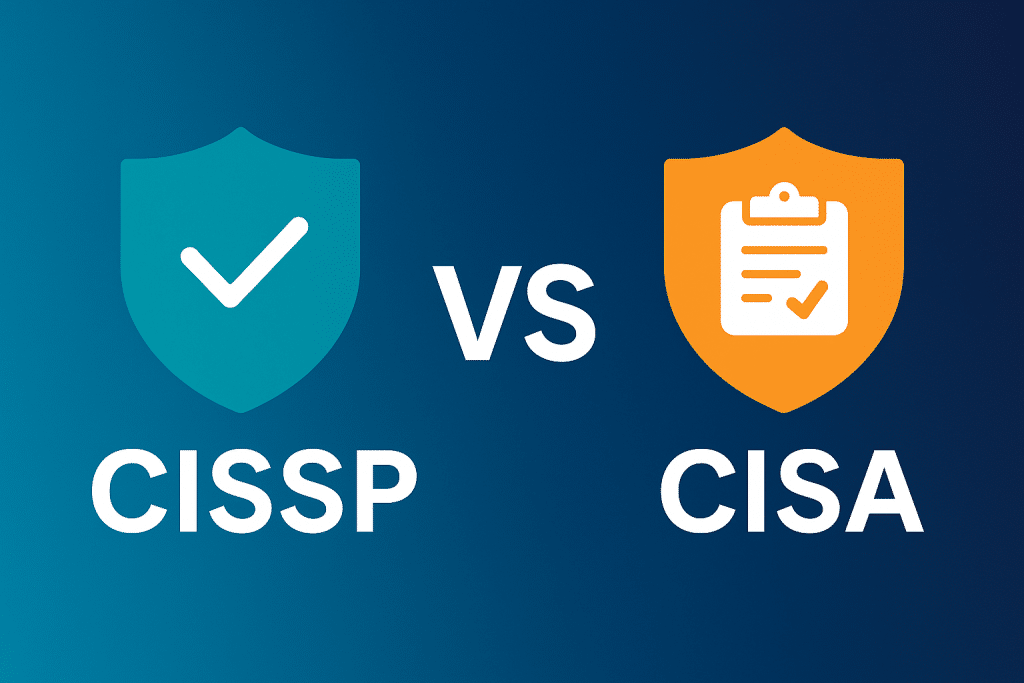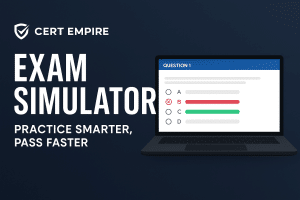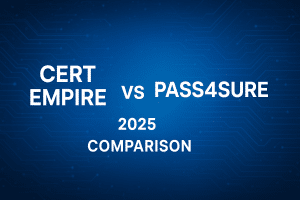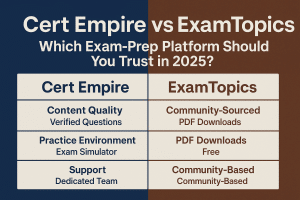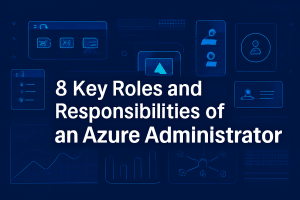At some point in your cybersecurity journey, this question pops up: Should I go for CISSP or CISA, or consider cisa and cissp together? If you’re already working in tech or security and feel like you’re ready to take things up a notch, these two certs are probably on your radar. And rightly so, both are respected, globally known, and can shift your career in meaningful ways. But they’re not built the same, and choosing one just because it “sounds” better can backfire.
The truth is, CISSP and CISA, or cissp and cisa certifications, are more than just exams. They represent different tracks. Different mindsets. Different kinds of responsibilities. One leans toward design and policy creation, the other into evaluation and control. So if you’re just looking for the one that’s “more popular” or “more technical,” you’re already heading in the wrong direction.
Before picking a lane, it helps for thorough understanding of the information security industry what each cert actually focuses on and how that fits your background, your job goals, and your preferred style of working.
CISSP vs CISA Comparison
| Criteria | CISSP | CISA |
| Full Name | Information Systems Security Certification | Certified Information Systems Auditor |
| Issued By | (ISC)² | ISACA |
| Focus Area | Cybersecurity management, architecture, and operations, network security identity | IT auditing, compliance, risk management, and controls |
| Target Audience | Security professionals with both technical and managerial roles | IT auditors, compliance analysts, and risk professionals |
| Experience Requirement | 5 years in at least 2 of the 8 CISSP domains | 5 years in IS auditing, control, or security (waivers possible) |
| Exam Duration | 4 hours (CAT format) | 4 hours |
| Number of Questions | 125–175 (adaptive) | 150 (multiple choice) |
| Difficulty Level | High – broad technical and managerial knowledge | Moderate – audit and compliance-focused knowledge |
| Certification Validity | 3 years (requires CPEs) | 3 years (requires CPEs) |
| Best For | Security managers, architects, CISOs | Security auditors, risk analysts, compliance officers |
| Average Salary | Higher (often over $120,000 annually in the US) | Moderate to high (often around $100,000 annually) |
What Really Sets Professional Certifications, CISSP and CISA Apart?
It’s easy to assume that because both certs are rooted in security, they must be similar. That’s not the case. CISSP and CISA reflect two very different approaches to cybersecurity, and your experience with either will depend heavily on what kind of work you enjoy doing.
CISSP certification stands for Certified Information Systems Security Professional, and if you’re mapping out your study plan, this step-by-step CISSP exam guide lays out exactly how to pass on the first try. It’s primarily aimed at professionals who handle large-scale security operations, system architecture, and policy development. If you’re someone who wants to build security frameworks from the ground up and make high-level decisions on how security is planned, implemented, and maintained, this one might speak to you.
On the other hand, CISA certification, Certified Information Systems Auditor, is geared toward professionals who work with audit processes, compliance, control assessment, and risk evaluations, making you cisa certified. It’s more of an assurance cert, focused on making sure that the systems and processes already in place are doing their job properly.
Let’s break this down a bit more clearly:
CISSP certification typically involves:
- Designing and managing security frameworks and information systems audit
- Leading security teams or initiatives
- Overseeing access control, cryptography, risk management, and system architecture
- Strategic-level thinking, with some technical depth
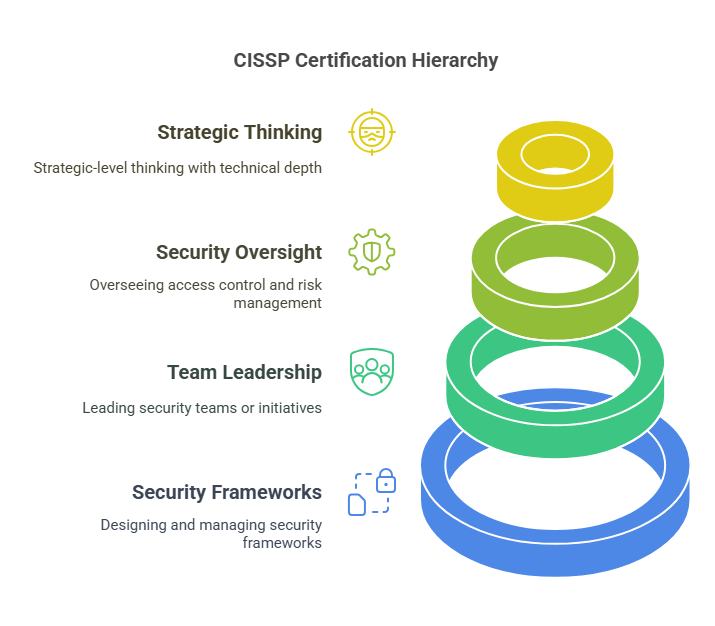
CISA certification typically involves:
- Auditing systems and IT infrastructure for compliance and risk management and network security
- Assessing whether security controls are effective and information systems acquisition
- Understanding control frameworks (like COBIT, NIST, ISO)
- Writing reports and presenting findings to leadership
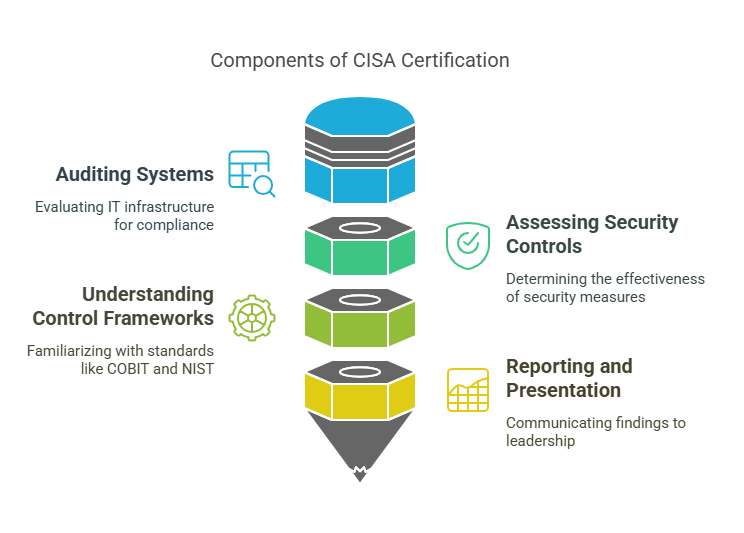
CISSP certification is usually more technical, while CISA certification leans into business process understanding. But here’s where people get confused: technical doesn’t always mean better. If you’re someone who understands business impact, can think analytically, and enjoys identifying weaknesses and process flaws, CISA can take you far, especially in organizations with strict regulatory requirements.
How Your Background Plays Into the Better Option
The cert that works best for you will probably line up with the kind of experience you already have. If you try to force a direction that doesn’t match where you’ve been or what you’ve done, it’ll feel like a struggle.
CISSP covers and tends to be a better fit if:
- You’ve spent time in system/network admin roles or cybersecurity operations
- You’ve worked on or managed security implementations
- You’ve been involved with policy writing, threat modeling, or incident response
- You want to shift into security leadership, architecture, or technical consulting
CISA makes more sense if:
- You’ve been in IT audit, GRC, risk assessment, or compliance
- You work in environments that revolve around audits or regulatory checks
- You enjoy detailed evaluations and reviewing internal controls
- You want to move into governance, assurance, or advisory roles
People with audit experience in auditing information systems will find the CISA material more familiar. If your daily job involves checking control systems, writing findings, and making sure teams stick to policies, then CISA focuses and complements what you already do. You won’t need to stretch too far.
For CISSP, it helps to already understand how multiple security systems and domains fit together. The cert isn’t just testing your ability to configure a firewall, it’s testing whether you know how to plan out an entire security posture. Even if you’re not writing every line of code or running every tool yourself, you need to know what good security design looks like.
Exam Format, Topics, and Time Commitment
CISA Exam Details
The CISA exam is built around five job practice domains that focus mostly on audit processes, IT governance, system acquisition, service access management, information system operations, and protection of information assets. Sounds dry? It can be, but it’s precise and structured.
- Number of Questions: 150
- Format: Multiple choice
- Duration: 4 hours
- Passing Score: Scaled, 450 out of 800
- Question Style: Direct but layered. Some feel simple until you realize two choices are technically right, only one is more “correct.”
Practicing with CISA dumps helps you see why only one option is the auditor’s ‘most correct’ choice. Practicing with CISA dumps helps you see why only one option is the auditor’s ‘most correct’ choice. To sharpen your audit mindset, check out free CISA exam questions and get a feel for the decision-making style the exam demands.
CISA leans heavily on your ability to think like an auditor of control association and business resilience. It’s not just about memorizing frameworks. It’s about understanding how to evaluate risk, whether a policy meets objectives, or how a finding should be documented.
CISSP Exam Overview
CISSP is a beast in comparison. It has eight domains of information security practices, each with enough depth to be its own separate cert. Think access control, asset security, cyber threats, software development security, communications, and so on.
- Number of Questions: 100–150 (adaptive format for English CAT)
- Format: CAT (Computerized Adaptive Testing) or Linear for some languages
- Duration: 3 hours (CAT) or 6 hours (Linear format)
- Passing Score: 700 out of 1000
- Question Style: Situational, dense, often vague on purpose
To get comfortable with those situational prompts, many candidates drill through CISSP exam dumps in PDF that mirror the adaptive format question-by-question. You can also build confidence by trying free CISSP practice test, a quick way to experience what real exam-style scenarios look like before you commit to full prep.
This isn’t the kind of test where you can just memorize terms. CISSP questions want you to think like a senior security leader. You’ll often get two decent answers and be asked to choose the “best” one depending on risk, business impact, or control priority. It can be frustrating if you’re not used to those kinds of decision-based questions.
Study Time Expectations
- CISA: 2 to 3 months for most people, assuming some audit or IT background.
- CISSP: 4 to 6 months, possibly more if you’re new to certain domains like software security or cryptography.
In short: cybersecurity certification like CISSP takes more effort and time to master. But both exams require serious prep. Don’t assume CISA is “easy” just because the content is narrower. It’s precise, and you’re expected to be familiar with how audit logic works in different business settings.
Serious prep demands reliable resources; the trusted exam dumps repository, Cert Empire keeps both CISSP and CISA materials current with every domain update.
The Experience Barrier: Who’s Actually Eligible?
This is where a lot of people hit a wall. Both CISSP and CISA aren’t open to just anyone. You can take the exam, sure, but you won’t be certified unless you meet the experience requirements.
CISSP Experience Rules
You’ll need five years of full-time, paid experience in at least two of the eight CISSP domains. No way around it. That experience needs to be verified after you pass the exam.
There’s a small buffer, if you’ve got a four-year degree or certain other certs (like Security+ or CISA), you can shave off one year from that total. But four years is still a decent chunk of experience.
Also, someone else who already holds the CISSP needs to endorse your experience before you’re officially certified. That’s something most people overlook.
CISA Experience Rules
CISA asks for five years of experience in the information systems auditing process, control, or security work. But they’re a bit more flexible than (ISC)². You can substitute some of that time with:
- One year for a degree
- One to two years for related work in fields like financial audit or internal control
- Experience waivers for university instructors or professors
You don’t need to meet these requirements before taking the exam, but you’ll need to fulfill them within five years after passing to actually receive your certification.
What Trips People Up
- CISSP’s endorsement requirement. People pass the exam and then realize they need to find a current CISSP to vouch for their experience. That delays things.
- CISA’s narrow definitions. If your experience isn’t labeled “audit,” even if you did similar work, ISACA might not count it unless it fits their framework exactly.
What These Certifications Actually Lead To in the Real World
Certs only matter if they get you hired or promoted. So, let’s drop the hype and look at what these really do for your job prospects.
CISSP: The Go-To for Security Architects and Leads
CISSP is the one hiring managers love to see for positions that involve decision-making, policy creation, and technical oversight. When someone’s building or overseeing a security program, they want someone who “gets” the full picture.
Roles that typically require CISSP:
- Security Architect
- Security Manager
- Cybersecurity Director
- Risk Program Leader
- Security Consultant
These are roles that come with ownership. You’re not just checking configs or patching servers. You’re deciding what controls need to be in place and how to prioritize them based on risk and business goals.
In larger companies, CISSP is often a gatekeeper cert. You don’t get into higher-paying roles unless you’ve got it, or something equivalent, which is rare.
CISA: The Compliance, Audit, and Control Specialist
CISA opens doors in a different direction. It’s all about validating your ability to look at systems critically and assess whether they’re being run properly.
Roles that align with CISA:
- IT Auditor
- Risk Analyst
- GRC Specialist
- Compliance Officer
- Audit Consultant
In finance, healthcare, or government, this cert carries serious weight. If there’s a regulatory body involved, HIPAA, SOX, PCI, GDPR. you’ll find CISA holders there. These aren’t the loudest jobs, but they’re stable and valued, especially in industries that face regular audits.
Demand and Recognition
- CISSP is more recognized globally and tends to lead to higher-paying roles.
- CISA is a niche heavyweight in audit-driven environments and is highly valued in firms that take risk seriously.
Neither is “better.” They just point you in different directions. If you like building things and making decisions, CISSP fits. If you like analyzing controls, writing reports, and advising on improvements, CISA’s where you want to be.
Which One Pays More? Not Always a Straight Answer
It’s the first thing most folks Google: CISA vs Cissp salary. Feels like an easy metric to compare, right? But the truth’s a bit messier. Salary depends on where you work, what industry you’re in, how much experience you’ve got, and what your role actually involves. A CISSP working in a low-level analyst job might earn less than a CISA in a senior audit position at a big consulting firm. Happens all the time.
That said, CISSP does tend to edge out CISA in average salary, mainly because the roles it supports often come with more responsibility and leadership weight. We’re talking six figures in many U.S. markets, especially for CISSPs with 5–10 years of experience.
Average Salary Estimates (U.S., 2025):
- CISSP: $120k – $160k depending on job title and region
- CISA: $95k – $125k with similar variables
But again, don’t just look at base pay. Bonus structures, job security, work-life balance, and even remote flexibility all play a role. A CISA working in a stable, remote GRC role with great hours might be better off long-term than a CISSP working 60+ hours in a chaotic security operations role. It’s not just numbers.
Factors That Can Push Salaries Higher:
- Location (NYC, SF, DC tend to pay more)
- Years of experience
- Additional certs (CRISC, CISM, CEH)
- Government vs private sector
- Niche industries (banking, pharma, defense)
So yes, CISSP might “win” in average numbers. But don’t choose a cert just because it pays a bit more on paper. Choose based on where you want to grow, because that’s what keeps your salary moving up over time.
Where These Paths Lead You in the Long Run
Okay, so you’ve earned the cert. Now what? Let’s talk about where CISSP and CISA can actually take you, especially in roles like chief information security officers not just in your next role, but in the kind of career you’ll build over the next 5–10 years.
CISSP as a Stepping Stone to Leadership
For a lot of folks, CISSP isn’t just a resume boost, it’s a door-opener into strategy and leadership. Once you have it, you’re often expected to do more than just implement controls. You’re setting direction, managing people, or influencing how an org deals with security risk.
Professionals focused on cloud and enterprise environments often compare these paths, so reviewing the CISSP vs CCSP certification guide can help clarify which aligns with your goals.
Typical progression for CISSP holders:
- Security Analyst → Security Engineer → Security Architect → Director of Security / CISO
- SOC roles → Threat Lead → Security Program Manager
- Consultant → Principal Consultant → Practice Lead or Managing Director
The higher up you go, the more people care about soft skills, communication, and the ability to work with non-technical stakeholders. CISSP certification exam gives you the foundation, but you’ll need to build out leadership chops if you want to really move.
CISA as a Gateway to Executive Assurance Roles
CISA is more focused in its direction, benefiting cisa certified professionals. People who get CISA often stay in audit, compliance, or risk. But that’s not a bad thing, those fields are high-demand, stable, and vital to any business dealing with third-party scrutiny.
Typical progression for CISA holders:
- IT Auditor → Senior Auditor → Audit Manager → IT Audit Director
- GRC Analyst → Risk Lead → Compliance Director → VP of Risk
- Consultant → Risk Advisor → Controls Assurance Lead
If you’re in financial services, healthcare, or anything tied to regulatory frameworks, CISA can take you all the way to the boardroom. You’ll be the one explaining audit findings to execs, helping shape internal controls, and keeping the org out of trouble with regulators.
Is One More “Future-Proof” Than the Other?
Not really, both are future-relevant, just in different ways. CISSP helps you stay competitive as orgs get more serious about zero trust, cloud security, and enterprise-wide policies. CISA stays crucial as compliance and data privacy laws keep tightening up.
Your real edge comes from combining your cert with actual, evolving skills. The cert gets you in the room. What you do after that is on you.
If you’re weighing CISSP against other advanced certifications, our CISSP vs CASP comparison outlines how these two stack up in terms of technical depth and industry demand
Can You (and Should You) Get Both?
Some folks look at both certs and think, “Why not do both and be done with it?” Fair question. And yes, plenty of people do eventually hold both CISSP and CISA. But the timing and reasoning, matters.
When Getting Both Makes Sense:
- You’re working in a hybrid GRC + Security Architecture role
- You’re in consulting and want to cover both technical and audit-heavy clients
- You’re aiming for roles like CISO, VP of InfoSec, or Director of Risk
- You want flexibility to move between industries or departments
In these cases, having both on your résumé gives you versatility. You show you can build secure systems and verify they’re being used correctly. That’s valuable.
When It Doesn’t Really Add Value:
- You’re early in your career and haven’t built deep experience in either area
- You’re going for deeply technical roles (like red teaming or pentesting)
- You only want the second cert for “resume padding”
Truth is, having both won’t automatically double your value. Recruiters aren’t just checking boxes. They’re looking to match real skills to real job needs. If you don’t use both, one of them becomes just a paper title. And that’s never a good look.
The Order Matters Too
If you’re starting out in audit-heavy roles or risk, CISA first usually makes more sense. If you’re more on the design/engineering side, start with CISSP and then evaluate whether CISA adds anything to your path.
For those earlier in their security journey, it might make sense to start smaller. Our CISSP vs Security+ breakdown explains how the entry-level and advanced paths differ.
Final Thought
Choosing between CISSP and CISA isn’t about chasing the most popular cert. It’s about backing the kind of work you actually want to do, day after day. Pick the one that gets you closer to the work that keeps you engaged, not the one that simply sounds better on paper. Before picking a lane, it helps to know where CISSP and CISA sit among the hardest cybersecurity certifications and what it actually takes to conquer them.
FAQs
Is CISSP harder than CISA?
CISSP is broader and tends to be more difficult for people without strong technical or leadership experience. CISA is more focused, but still challenging in how it tests audit thinking.
Which is better for a security management role?
CISSP. It aligns more with leadership, risk planning, and long-term security strategy. CISA is better for those looking at internal audit, GRC, or compliance-heavy roles.
Can I take the CISA exam without formal audit experience?
Yes, but you won’t be certified until you fulfill the work experience requirements within five years of passing the exam.
Does CISSP require a technical background?
Not strictly, but it definitely helps. You’ll need to understand systems, networks, and controls conceptually even if you’re not hands-on daily.
Which pays more: CISSP or CISA?
On average, CISSP leads to higher-paying roles. But your actual salary depends more on job title, company, and industry than just the cert.
Is it worth getting both certifications?
Only if your role overlaps both audit and architecture. Otherwise, holding both isn’t necessary unless your job demands it.
Can CISSP holders apply for audit jobs?
They can, but they might lack the detailed audit methodology knowledge CISA holders are trained in. It depends on the job.
How long does it take to prepare for the CISA exam?
Most people need 2–3 months, depending on experience. If you’re new to audit concepts, you might need more.
Does CISSP expire if not renewed?
Yes. CISSP requires continuing professional education (CPE) credits and an annual maintenance fee. Same goes for CISA.
Which exam has a higher pass rate?
CISA generally has a higher pass rate. CISSP’s pass rate is lower mainly due to its wider scope and decision-based question style.
Last Updated on by Team CE

